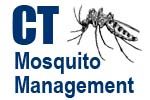Mosquito Control Using Larvicides - Frequently Asked Questions
The reduction of mosquito-breeding sites is the most effective action homeowners can take to control mosquitoes. Reduction of these sites can greatly lessen the potential for West Nile virus from becoming a significant human health threat.
How can I reduce mosquitoes around my property?
Elimination of backyard mosquito-breeding habitats is the first step in reducing mosquitoes. Examples of breeding habitats are clogged rain gutters, used tire piles, and trash that collects water.
-
Empty garden containers, wading pools, birdbaths, etc. at least once a week.
-
If the source cannot be eliminated, use a product (larvicide) to reduce mosquito larvae. Mosquito larvae (and pupae) are immature mosquitoes that live in stagnant water before maturing into flying adults. Their growth rate depends largely on water temperature and can be as little as 7 to 10 days in warm weather.
-
Using adulticides (spraying to kill adult mosquitoes) is another option; however, it is costly, not as effective, and is reserved for times when the risk to public health from mosquito-borne disease is high.
Where do I use larvicide?
The use of larvicides involves the application of approved pesticides to aquatic habitats where mosquito larvae thrive:
-
Ornamental ponds (with no fish)
-
Non-chlorinated swimming pools
-
Pool covers
-
Low-lying areas that maintain stagnant water for more than one week
-
Marshy areas fully within homeowners’ property lines
-
Rainwater cisterns
-
Retention basins
-
Catch basins
-
Roadside ditches
What kind of larvicides can I use around my home?
Bacillus thuringiensis var. israelensis (Bti) is a biological pesticide that is a naturally-occurring bacteria found in soil throughout the world. Bti is used for mosquito larval control in a broad range of freshwater and saltmarsh habitats. No special licensing or certification by the DEEP is needed if these products are used on a homeowner’s own property. Bacillus sphaericus (Bs) is a biological pesticide with the common brand name Vectolex*. This product may not be marketed for homeowner use, therefore, is not available to homeowners in Connecticut.
Where can I get Bti?
There are only a few Bti products available to homeowners through hardware stores or nursery and garden centers. Common brand names for Bti are Mosquito Dunks*, VectoBac*, Aquabac*, and Bactimos*.
What kind of larvicides need a licensed applicator or a permit?
-
Methoprene, an insect growth regulator. A common brand name is Altosid*.
-
Larvicidal oils or monomolecular surface films (MMF). A common brand name of an MMF is Agnique*.
-
Oils that are not specifically designated for mosquito control cannot be used or substituted for larvicidal oils.
Connecticut pesticide regulations require that the applicator is licensed and obtain a permit from the DEEP prior to using these products. These products are not registered for homeowner use.
Can larvicides affect my health?
Biological pesticides such as Bti are very specific to mosquito, black fly, and midge larvae and are not known to affect human health. Due to the very low toxicity of methoprene and low potential for human exposure, methoprene does not present a health threat.
Who can I call for more information on using pesticides?
-
Contact the DEEP Pesticide Unit at 860-424-3369 if you have questions about pesticide use and regulations.
-
Any larvicide used in Connecticut must be registered with the U.S. Environmental Protection Agency and the Connecticut Department of Energy and Environmental Protection (DEEP) Pesticide Unit.
-
In addition, certain products or their use may require that the applicator is licensed by the DEEP to apply mosquito or public health pesticides and a permit may be needed from the DEEP to apply them to certain water bodies or wetlands.
Who can I call for more information on mosquito-breeding habitat?
Contact the DEEP Wetland Habitat and Mosquito Management Unit at 860-424-3011 if you have questions on mosquito breeding habitat reduction and mosquito control measures.
* Note: the mention of a brand name does not imply the endorsement of any product by the Connecticut Mosquito Management Program.
Content last updated on March 14, 2019.

